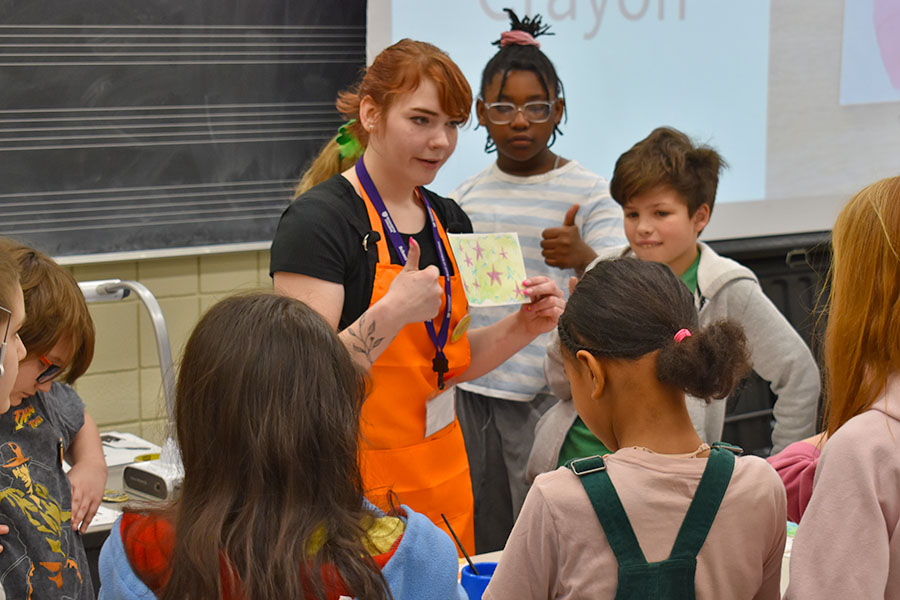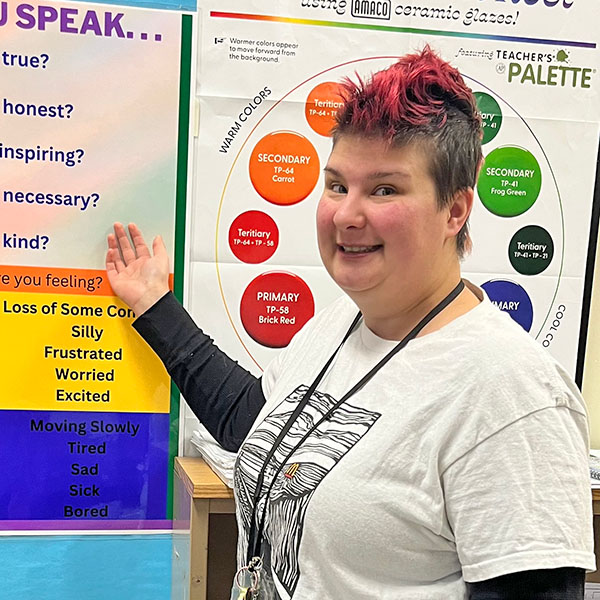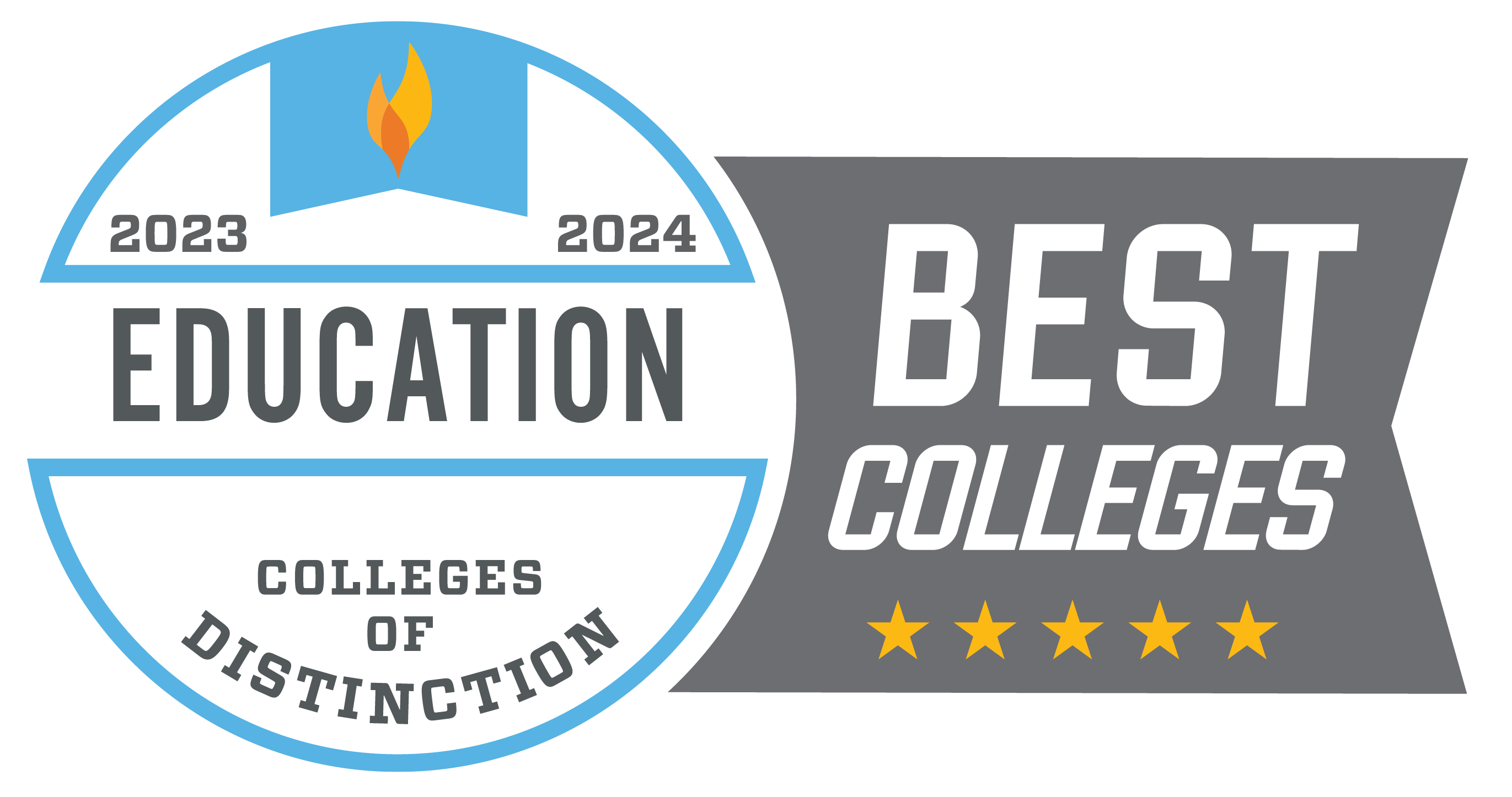Art Education
Master of Science in Education
Art educators are more than just teachers. They’re artists. Our program is built around that fact.
- Learn to present the study and creation of art in exciting and meaningful ways, while continuing your lifelong development as an artist.
- Nazareth University is among the most highly respected colleges and universities in New York state for art education. This M.S.Ed. program meets National Art Education Association standards for teacher preparation.
Curriculum: Initial Certification / Professional Certification • Affordability • Program Director

Highlights
Classes meet one evening a week
Traditional (on-campus), hybrid (half online), and online classes offered
Complete in as fast as 4 semesters full-time
Fieldwork and student teaching for initial certification
Program Options
Initial Certification (48 credits)
Program is ideal for:
- People with an undergraduate degree in studio art, art history, or museum education seeking initial teacher certification (for birth through grade 12). If your undergraduate degree was in another field, you must complete 30 undergraduate credits in studio art (including 6 credits in art history) to apply for the program.
- People who've taught in after-school programs, private studios, or extracurricular art programs and want to transition into public education.
- Educators who want to incorporate teaching, art, research, and advocacy for the arts into their classroom. Unlike larger programs that are entirely research-based, Nazareth's holistic program builds in time to support your development as a practicing artist.
Catalog: Initial certification program requirements and course descriptions »
Professional Certification (36 credits)
Professional is ideal for:
- Initially certified teachers wanting to become professionally certified in art. Our studio classes — such as drawing, painting, printmaking, photography, book design, and computer graphics — expand your repertoire as an artist and enhance your teaching of general art.
- Educators who want to incorporate teaching, art, research, and advocacy for the arts into their classroom. Unlike larger programs that are entirely research-based, Nazareth's holistic program builds in time to support your development as a practicing artist.
Catalog: Professional certification program requirements and course descriptions »
What to Expect
- Nazareth's affordable cost for grad teaching degrees makes this high-demand certification within reach, enabling you to fill a needed teaching position in a school district in the local region or beyond.
- Graduate with real-world experience. Initial-certification seekers run their own classroom in our on-campus Saturday Art School community program for grades K-12, as field work prior to student teaching.
- You have the option to study abroad for a semester, taking studio classes at L'École Supérieure des Arts Appliqués (LISAA), a private college in Rennes, France that partners with Nazareth.
- You can choose to get specialized preparation in working with children with autism. See details about the Interdisciplinary Specialty Program in Autism (I-SPAN) specialization.
- Nazareth's full-time director of clinical experiences and partnerships and full-time certification officer provide you with strong support, including prep for certification exams and facilitating hands-on experiences with students. If you're working in a school district, this can include facilitation with your own school district so you can meet degree requirements while keeping your job.
- Your full-time career coach for education (part of Nazareth's nationally recognized Center for Life's Work) is available for resume, interviewing, and job search guidance.
- Additional guidance and support is available from your individual academic advisor and from the School of Education's director of academic support services.

Why Nazareth?
“I feel beyond prepared, thanks to Professor Nolte’s leadership and assignments. And teaching at Saturday Art School at Naz prepares you for almost anything. Now I can show up every day to teach art and know that I’m going to have a super great day. Naz was a good fit because I could complete my art education degree part-time while working. My advice: Wherever your passion lies, pursue that. I might have been an art teacher sooner if I did that. I was told art was a hobby. But now I’m doing what makes me happy, and I spread positivity and joy to children. I like seeing the students proud of their decisions and their work, and I like it when the students start quoting me. I often ask: ‘Does that bring you joy?’ Other kids say it to each other now.”
— Elyse Harzynski ‘24G, an art teacher at Padilla High School in Rochester, New York
Value of Your Degree
- Graduates are highly likely to find jobs. In recent years, 100% of graduates seeking a job in art education were hired in their field.
- Many regional art teachers are Nazareth grads, offering networking opportunities.
- Median salary for teachers is about $64,000 (U.S. Bureau of Labor Statistics, 2023), plus an excellent pension system.

Renowned for Art Education
Making Grad School Affordable
Grants, scholarships, veterans benefits, partner benefits, loans, and undergraduate loan forgiveness are options for paying for this grad degree. Are you committed to teaching in high-needs schools? See if you are eligible for the Teacher Opportunity Corps II (TOC II) Scholarship.
Curriculum Examples
- Artist-Teacher/Researcher Identities
- Arts Across the Curriculum
- Issues in Art Education
- Foundations of Learning in the Arts
- Diverse Learners in Art Education
- Visual Books
- Fibers and Innovative Craft Traditions
Accreditation
All programs in the Art and Design Department are accredited by the National Association of Schools of Art and Design (NASAD). This accreditation means that our faculty, curriculum, and facilities meet or exceed national standards.

Leading a public arts project
“The art education program demands professionalism and excellence, and inspired me to raise my expectations on what I could accomplish with the arts in education," said Marissa Lehner ‘15G, director of Ferry Street Corridor Project. She secured a $100,000 National Education Association grant to launch the education-based public arts program in Buffalo.
Her first grad class required her to participate in an arts advocacy project in the community, which led to her making valuable connections and drew her to work in lesser-known neighborhoods. "The studio classes I took expanded upon my skills in the areas of design, computer graphics and sculpture. The program made me a more versatile project director and creative in problem solving throughout the project.”